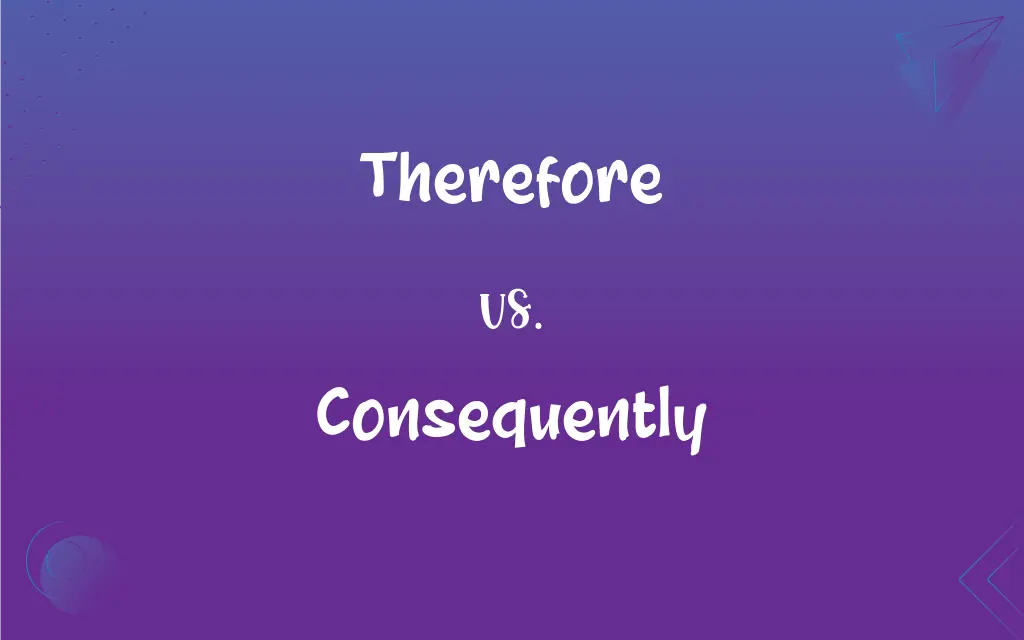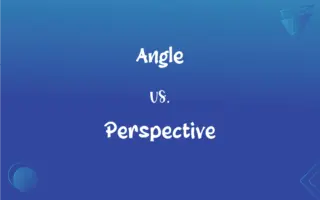Therefore vs. Consequently: What's the Difference?
Edited by Harlon Moss || By Janet White || Updated on September 21, 2023
"Therefore" and "Consequently" both indicate a result or effect, but "Therefore" emphasizes reason, while "Consequently" stresses the result or outcome.

Key Differences
"Therefore" and "Consequently" are transitional words used to show cause and effect relationships between statements, with subtle distinctions between them. "Therefore" is used to draw a conclusion based on reasoning, typically employed when there is a logical inference from the preceding statement. "Consequently," meanwhile, puts more emphasis on the resulting effect or outcome following a certain action or condition.
When "Therefore" is used, it typically signals a conclusion reached through logical deduction or reasoning from the preceding statements. It serves to illustrate that the subsequent statement logically follows from the previous ones. "Consequently" is more focused on the aftermath or outcome that occurs due to a certain condition or set of conditions, highlighting the consequential nature of actions.
The employment of "Therefore" in a sentence generally serves to indicate that what follows is a reasoned conclusion, presenting a sequence of thoughts leading to a logical endpoint. On the other hand, "Consequently" delineates the resulting situation or event that has occurred as a direct result of the preceding actions or conditions, underscoring the effects or results of those actions.
"Therefore" serves to underline a logical connection between statements, essentially saying that given the provided information, the following conclusion can be drawn. "Consequently" emphasizes more on the real-world impacts or outcomes, reflecting a cause-effect relationship where a particular situation leads to a specific result.
In summary, while "Therefore" draws attention to the logical reasoning leading to a conclusion, "Consequently" stresses the outcomes or effects that follow a particular action or condition, portraying the inevitable result of preceding circumstances.
ADVERTISEMENT
Comparison Chart
Emphasis
On logical reasoning and inference.
On results or outcomes.
Usage
To present conclusions drawn from reasoning.
To present outcomes following an action or condition.
Connection
Highlights logical connection between statements.
Highlights cause-effect relationship between actions.
Purpose
To indicate that what follows is a reasoned conclusion.
To indicate that what follows is a result or effect.
Context
Typically more formal and often used in mathematical or logical discussions.
More focused on real-world impacts and outcomes.
ADVERTISEMENT
Therefore and Consequently Definitions
Therefore
Consequently, it follows that; hence.
She studied hard; therefore, she got good grades.
Consequently
Hence; therefore.
The road was icy; consequently, driving was dangerous.
Therefore
Used to introduce a conclusion that can be drawn from the preceding clause.
The weather was bad; therefore, the event was canceled.
Consequently
As a consequence of.
She didn’t study; consequently, she failed the test.
Therefore
As a logical consequence; for that reason.
The evidence was insufficient; therefore, he was acquitted.
Consequently
Following as a result or effect.
He forgot his umbrella; consequently, he got wet.
Therefore
For that reason; consequently.
He was late; therefore, he had to hurry.
Consequently
Resulting from a preceding action or condition.
He overslept; consequently, he missed the train.
Therefore
As a result of that; consequently.
The book is out of print; therefore, it is hard to find.
Consequently
As a result; therefore.
Therefore
For that reason or cause; consequently or hence.
Consequently
(conjunctive) As a result or consequence of something; subsequently.
He didn't wake up early. Consequently, he was late to work.
Therefore
(conjunctive) Consequently, by or in consequence of that or this cause; referring to something previously stated.
Traditional values will always have a place. Therefore, they will never lose relevance.
Consequently
Subsequently, following after in time or sequence.
Therefore
For that; for it (in reference to a previous statement)
Consequently
By consequence; by natural or logical sequence or connection.
Therefore
For that or this reason, referring to something previously stated; for that.
I have married a wife, and therefore I can not come.
Behold, we have forsaken all, and followed thee; what shall we have therefore?
Consequently
(sentence connectors) because of the reason given;
Consequently, he didn't do it
Continued to have severe headaches and accordingly returned to the doctor
Therefore
Consequently; by consequence.
He blushes; therefore he is guilty.
Consequently
As a consequence;
He had good reason to be grateful for the opportunities which they had made available to him and which consequently led to the good position he now held
Therefore
(used to introduce a logical conclusion) from that fact or reason or as a result;
Therefore X must be true
The eggs were fresh and hence satisfactory
We were young and thence optimistic
It is late and thus we must go
The witness is biased and so cannot be trusted
Therefore
As a consequence;
He had good reason to be grateful for the opportunities which they had made available to him and which consequently led to the good position he now held
FAQs
Is "Consequently" more about real-world impacts?
Yes, "Consequently" is more focused on real-world impacts or outcomes of actions.
Is "Therefore" used to denote logical conclusions?
Yes, "Therefore" is used to denote logical conclusions drawn from reasoning.
Can "Therefore" be used in mathematical contexts?
Yes, "Therefore" is often used in mathematical or logical discussions to present reasoned conclusions.
Can "Consequently" be used to highlight aftermaths of actions?
Yes, "Consequently" can be used to highlight the aftermaths or outcomes following certain conditions or actions.
Does "Therefore" imply a logical inference?
Yes, "Therefore" implies that what follows is a logical inference from the preceding statement.
Can "Consequently" depict cause-effect relationships?
Yes, "Consequently" depicts the cause-effect relationship between actions or conditions.
Can "Consequently" imply a subsequent development?
Yes, "Consequently" implies a subsequent development due to preceding circumstances.
Is "Therefore" synonymous with hence?
Yes, "Therefore" is synonymous with "hence" and is used to introduce conclusions.
Does "Consequently" emphasize results or effects?
Yes, "Consequently" emphasizes the results or effects following a certain action or condition.
Does "Therefore" highlight logical connections between statements?
Yes, "Therefore" serves to highlight logical connections between statements.
Is "Therefore" used in deductive reasoning?
Yes, "Therefore" is often used in deductive reasoning to present conclusions.
Can "Consequently" be used in everyday conversation?
Yes, "Consequently" can be used in everyday conversation to denote results or effects of actions.
Is "Therefore" typically more formal than "Consequently"?
Yes, "Therefore" is typically considered more formal and is often used in academic writing.
Does the use of "Therefore" indicate a sequence of thoughts?
Yes, the use of "Therefore" indicates a sequence of thoughts leading to a logical conclusion.
Is "Consequently" synonymous with as a result?
Yes, "Consequently" is synonymous with "as a result" and indicates outcomes following an action or condition.
About Author
Written by
Janet WhiteJanet White has been an esteemed writer and blogger for Difference Wiki. Holding a Master's degree in Science and Medical Journalism from the prestigious Boston University, she has consistently demonstrated her expertise and passion for her field. When she's not immersed in her work, Janet relishes her time exercising, delving into a good book, and cherishing moments with friends and family.
Edited by
Harlon MossHarlon is a seasoned quality moderator and accomplished content writer for Difference Wiki. An alumnus of the prestigious University of California, he earned his degree in Computer Science. Leveraging his academic background, Harlon brings a meticulous and informed perspective to his work, ensuring content accuracy and excellence.































































